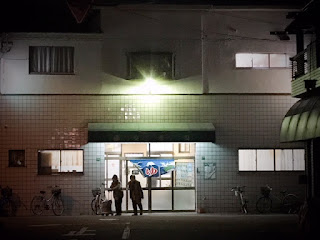People’s bonds over 50 years...
I grew up going to public bathes, “銭湯” (Sento) because my childhood house didn’t have either shower or bath tub at home. Not only for my family's , but also for my neighbor’s, most didn’t have any bath room at home because of the old wooden architectural shopping arcade partitioned into at least more than three houses called ”長屋” (Nagaya). And so public bathes were important and inevitable, and its “Sento” culture was one of the essentials in our life.
However as we shifted to our current “Heisei period” from the previous “Showa period” which is often considered as Good old days, we became to put more emphasis on individualism surely influenced by western-ism. More houses with individual bath space at home.
”銭湯” (Sento) culture still exist in towns such as my home town and the area where I currently live.
”銭湯” (Sento) culture still exist in towns such as my home town and the area where I currently live.
This is my third times I moved back to this town, Nagai. One of my important factors in finding a new flat was if my neighbor has at least one or two public bathes around. It all needed to be very close to my place by foot, or by bicycle. Even if my flat has both a shower and bath tub, I really don't mind at all going to the public bathes every day.
It surely costs me somehow, but I just can't give up these amazing relaxing place. Recent ”銭湯” (Sento) are different from the old fashioned ones in design and size, and also the relationship between the guests and the ”銭湯” (Sento) masters.
It surely costs me somehow, but I just can't give up these amazing relaxing place. Recent ”銭湯” (Sento) are different from the old fashioned ones in design and size, and also the relationship between the guests and the ”銭湯” (Sento) masters.

On 29th January, one of my favorite ”銭湯” (Sento) in my neighbor, “交生湯” (Kouseiyu) closed its over 50 years of history which still had a strong "Showa period" atmosphere. With its simple design and less bath tub, it might have become out of fashion, and left it behind the times. However, one thing for sure, there were warm bonds with people, even if they were acquaintances, or strangers.
One of outstanding factors of Showa period's ”銭湯” (Sento) is that the front desk is located inside the changing rooms. The ”銭湯” (Sento) masters in charge are mostly ladies and sit in the front desk to collect the admission fees. The doors to enter the changing rooms are of course separated for male and female.

For “交生湯” (Kouseiyu), I'm emotionally attached to this place. My first visit was back in 1998 when I moved to Nagai for the first time at the age of 25.
20 years ago!
I was young, and had been through kinda trials and errors of life to seek my ideal future. Fell in love and separated. Changed jobs one into another not knowing what to do.
I'm really satisfied with what I am now and my current life. However I can't stop feeling now that I would've never come to this point without any challenges in those days. And this “交生湯” (Kouseiyu) is one of the few places which knows what I used to be then.

The ”銭湯” (Sento) masters were sisters. The elder sister started the business with her husband more than 50 years ago, and later her younger sister took over the business. These sisters are so amazing. They both has an amazing smile and energy. That's why I kept going to this “交生湯” (Kouseiyu).
I tell you that this place had strong humanity bonds among local people which may be lacking in these modern societies. And these sisters' smiles must have been helping to build it up for sure.
Very pity, but we always need to follow the current of eras.
Masami




コメント
コメントを投稿